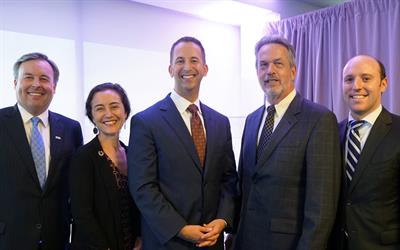Colleagues:

Coordinator Staley and Deputy Coordinator Steketee meet with global health champions at PMI Welcome Event in Washington, DC. Photo credit: United Nations Foundation.
As I approach the midway mark of my first year as U.S Global Malaria Coordinator, I wanted to thank the wide-reaching network of PMI supporters and the broader malaria community who make this job, at least in my opinion, the absolute best job in Washington, DC. I would also like to welcome Dr. Rick Steketee, who recently joined PMI’s dedicated staff as Deputy Coordinator. As an internationally recognized expert in malaria and medical epidemiologist, Rick brings a wealth of knowledge and is a valued addition to the team.
Taking a moment to look back on the fight to date, I see progress worth celebrating, difficult hurdles overcome, and most importantly a tireless group of public servants, health workers, academics, non-profits, private sector actors, the faith community, and donors rallied around the singular goal of ending the deadliest disease in human history.
This network is, and will continue to be, of the utmost importance as we confront the reality of an increasingly diverse epidemiological landscape with rapid population growth, and an adapting vector. We all achieve more when we work together and leverage each other’s strengths and comparative advantages.
Last month I had the privilege of attending the 73rd Session of the United Nations General Assembly, representing PMI and the U.S. Government’s commitment against malaria. During the official malaria endemic country and partner event, I took this opportunity to underscore that by working closely with country, regional, and global partners, we can significantly reduce malaria as a major public health threat, interrupt the cycle of poverty, and develop self-reliant and resilient communities. To do so, we must coordinate not only our investments for malaria control, but leverage the increasingly available data from the field to maximize impact. We need to build and sustain a transparent and open data environment. I am committed to fostering an environment that encourages this mindset in the countries where PMI works and globally.
Fighting malaria is one of the smartest investments anyone can make to protect health, create opportunity, and foster growth and security, which is why PMI and our partner countries are grateful for the continued support of the U.S. Congress. Starting with fiscal year 2017 funds, PMI was able to expand into five new countries: Burkina Faso, Cameroon, Côte d’Ivoire, Niger, and Sierra Leone, benefitting an additional 90 million people in the West-to-Central Africa corridor. I am happy to report that in all five countries the first PMI staff are already on board, PMI implementing partners are operational, early foundational activities such as entomological baseline assessments have been completed, and initial essential malaria commodity orders have been placed — filling much needed gaps in insecticide-treated nets, rapid diagnostic tests, and antimalarial drugs.
In closing, it’s been an exciting and eye-opening six months and I look forward to seeing some of you at the American Society of Tropical Medicine and Hygiene Annual Meeting, reading the 2018 World Malaria Report, and celebrating the 20th Anniversary of the RBM Partnership to End Malaria this fall. I’m honored to join the fight and look forward to continuing work with all of you to end malaria for good.
Regards,

Ken Staley, MD
U.S. Global Malaria Coordinator
